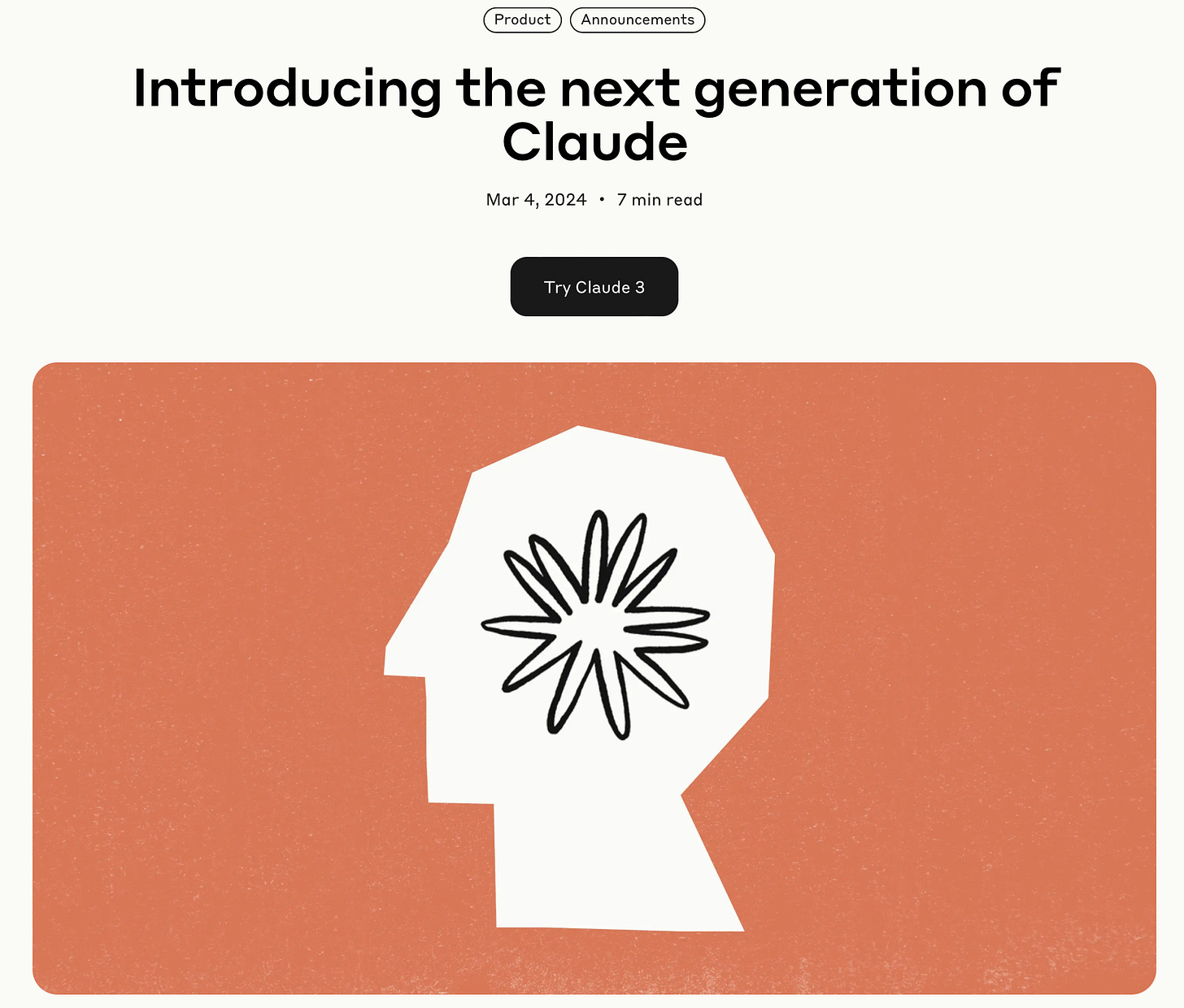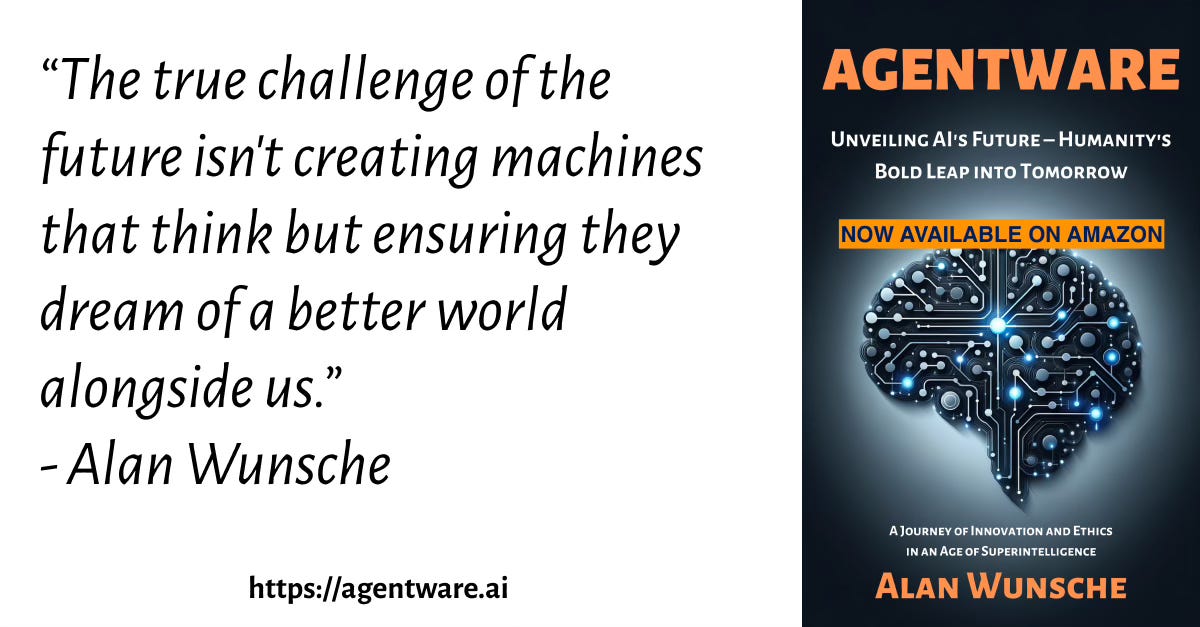Unveiling the Future of AI: Anthropic Launches Claude 3 Model Family. AWS Announces Availability.
Setting new benchmarks in AI performance, Anthropic's Claude 3 series revolutionizes cognitive computing across industries.
In my AI novel about the future of AI agents in the enterprise, “AGENTWARE: Unveiling AI's Future – Humanity's Bold Leap into Tomorrow (Amazon)”, Ana Patel and her Julie Anderson, her CIO, are surprised to see GPT-5 come so quickly; with more powerful AI agents, they adjust their plans accordingly. Could their AI agents gain a new level of autonomy with GPT-5?
Today, a new foundation model family was released by Anthropic, which it claims rivals GPT-4. We’re not even done Q1/24 and increasingly intelligent models keep coming!
TL;DR:
Launch of Claude 3 Models: Anthropic unveils the Claude 3 model family, including Claude 3 Haiku, Claude 3 Sonnet, and Claude 3 Opus, setting new benchmarks in AI capabilities.
Advanced Intelligence and Performance: The models excel in cognitive tasks, showcasing near-human comprehension, superior analysis, forecasting abilities, and enhanced vision capabilities.
Speed, Efficiency, and Accessibility: Claude 3 models provide near-instant results for a variety of applications, with Haiku noted for its speed and cost-effectiveness, and Sonnet and Opus offering a balance of speed and advanced intelligence.
Improved Accuracy and Reduced Refusals: Enhancements in model accuracy and contextual understanding have been achieved, alongside fewer unnecessary refusals, making the models more reliable and user-friendly.
Extended Context Window and Recall: Initial offering includes a 200K context window, with potential for inputs exceeding 1 million tokens, and near-perfect recall capabilities for long context prompts.
Responsible AI Development: Anthropic emphasizes the responsible creation of the Claude 3 models, with efforts to mitigate risks, address biases, and ensure the models' safety and neutrality.
Ease of Use and Diverse Applications: The models are designed for ease of use in complex instructions and structured output, catering to a wide range of applications from task automation to customer interactions.
Today marks a pivotal moment in the realm of artificial intelligence as Anthropic announces the launch of its Claude 3 model family. This groundbreaking series, including Claude 3 Haiku, Claude 3 Sonnet, and Claude 3 Opus, redefines the standards of AI capabilities, offering unprecedented levels of intelligence, speed, and efficiency tailored to a wide array of applications.
Claude 3: A Triad of Excellence
Anthropic's Claude 3 family introduces three distinct models, each designed to cater to specific needs and applications. The Claude 3 Opus, being the pinnacle of this series, showcases superior intelligence by outshining competitors in various cognitive benchmarks. It's complemented by the Claude 3 Sonnet, which balances speed and intelligence for enterprise needs, and the Claude 3 Haiku, designed for rapid response and cost-efficiency.
Claude 3 model family
Below is a comparison of the Claude 3 models to those of our peers on multiple benchmarks [1] of capability:
Revolutionary Capabilities and Performance
The Claude 3 models excel across a broad spectrum of tasks, from nuanced content creation and code generation to conversing in multiple languages and displaying advanced vision capabilities for processing diverse visual formats. Their enhanced abilities in analysis, forecasting, and even understanding complex, multi-step instructions pave the way for innovative applications in various fields.
Speed and Efficiency Redefined
With a focus on real-time applications, Claude 3 models deliver near-instant results. Haiku emerges as the market leader in speed and cost-effectiveness, while Sonnet offers double the speed of its predecessors without compromising on intelligence. Opus maintains comparable speeds but with significantly greater intelligence, ensuring efficiency without sacrificing performance.
Enhanced Accuracy and Fewer Refusals
The Claude 3 family marks a significant improvement in accuracy and contextual understanding. By reducing unnecessary refusals and improving the accuracy of responses, these models become more reliable and trustworthy for businesses and developers alike. The introduction of citation capabilities further enhances their utility by verifying answers against reference material.
Long Context Processing and Near-Perfect Recall
Initial offerings include a 200K context window, with potential expansions to accommodate inputs exceeding 1 million tokens. This capability, combined with near-perfect recall on the 'Needle In A Haystack' evaluation, showcases the models' exceptional ability to process and recall vast amounts of information accurately.
Commitment to Responsible AI
Anthropic emphasizes the responsible development and deployment of the Claude 3 family, addressing potential risks and biases with dedicated teams and innovative methods like Constitutional AI. The models are designed to be as trustworthy as they are capable, adhering to Anthropic's Responsible Scaling Policy and ensuring safety and neutrality in their operations.
Easier Integration and Diverse Applications
The Claude 3 models are not only more intelligent but also easier to use, adhering to brand voice and response guidelines seamlessly. Their ability to produce structured output formats like JSON simplifies integration into various use cases, from task automation and R&D to strategy and customer interactions.
Conclusion: A Leap Forward for AI Development
Anthropic's Claude 3 model family sets a new standard for AI performance, opening up new possibilities for innovation and application across industries. With their unparalleled capabilities, speed, and intelligence, the Claude 3 models are poised to transform the landscape of cognitive computing and drive positive societal outcomes. As Anthropic continues to push the boundaries of AI, the Claude 3 family represents a significant step forward in realizing the full potential of artificial intelligence.
Amazon Bedrock expands its model selection with Anthropic’s industry-leading Claude 3 family
Customers will be able to access the Claude 3 family of vision-enabled models—Claude 3 Opus, Claude 3 Sonnet, and Claude 3 Haiku—on Amazon Bedrock, with Sonnet available today. The record-breaking Opus model and Haiku model will be available in the coming weeks.
According to Amazon’s Announcement:
AWS and Anthropic continue to grow their strategic collaboration.
More than 10,000 organizations worldwide are already using Amazon Bedrock to build their generative AI applications.
AWS continues to invest across all three layers of the generative AI stack.
“Today’s news is the latest AWS generative AI announcement as the company continues to expand its unique offering at all three layers of the generative AI stack—infrastructure, models, and user-facing applications—so customers can use generative AI in a more efficient, extensive, and integrated way across their organizations. The addition of the latest Anthropic Claude models is a continuation of this commitment to provide the latest, most powerful models to help customers accelerate innovation using generative AI.”
“The new, cutting-edge additions from Anthropic broaden Amazon Bedrock’s range of generative AI models (which already includes those from AI21 Labs, Anthropic, Cohere, Meta, Mistral AI, Stability AI, and Amazon), further empowering customers with model choice to develop generative AI applications to drive innovation and reinvent end-user experiences.”
Amazon is certainly living up to its promise of giving its customers choice of foundation models.
Sources:
Introducing the next generation of Claude. Anthropic. March 4, 2024. https://www.anthropic.com/news/claude-3-family
Access to the most powerful Anthropic AI models begins today on Amazon Bedrock. Amazon Web Services. March 4, 2024. https://www.aboutamazon.com/news/aws/amazon-bedrock-anthropic-ai-claude-3?sc_channel=sm&sc_publisher=LINKEDIN&sc_geo=GLOBAL&sc_outcome=awareness&linkId=346628267
Generative AI for every business. Amazon Web Services. March 4, 2024. https://aws.amazon.com/generative-ai/
Discussion Questions:
Ethical Boundaries and AI Governance: How can we ensure that the development of advanced AI technologies such as Claude 3 aligns with societal values and norms, and what governance mechanisms are necessary to navigate the ethical complexities they present?
The Future of Work and AI Integration: As AI technologies redefine job roles and skills, what strategies should organizations employ to prepare their workforce for a future where human roles are deeply intertwined with AI capabilities?
Bias and Fairness in AI: In the development of AI technologies, how can we address and mitigate biases to ensure fairness, particularly in applications with significant societal impact like justice, healthcare, and employment?
Privacy and Data Security in the Age of AI: With AI's ability to process and generate vast amounts of data, what are the key challenges to personal privacy and data security, and how can these be overcome to protect individuals in a data-driven future?
The Takeaways
Anthropic's Claude 3 model family introduces a new era of AI with three distinct models: Haiku, Sonnet, and Opus, each tailored for different applications.
The models set new industry benchmarks for intelligence, speed, and efficiency, excelling in a wide range of cognitive tasks.
Enhanced accuracy, fewer refusals, and the ability to process long contexts demonstrate the models' advanced capabilities and reliability.
A commitment to responsible AI development ensures the Claude 3 family is safe, trustworthy, and neutral, addressing potential risks and biases.
The introduction of the Claude 3 models opens up vast opportunities for innovation and application across various industries, promising to transform cognitive computing and drive positive outcomes.
Engage and Comment
Anthropic's groundbreaking advancements are reshaping the landscape of artificial intelligence, ushering us into a new era of technological capabilities and ethical considerations. As we stand on the brink of these significant shifts, it's crucial to ponder the broader implications of such sophisticated AI on society, industry, and our daily lives.
What are your thoughts on the future shaped by Anthropic's AI innovations? Do you see a realm of limitless potential and positive transformation, or are there aspects that spark concern or debate for you?
Dive into the discussion and share your thoughts below.
If you’re interested in the future of AI agents in enterprise, I encourage you to check out “AGENTWARE”, now available in Paperback: AGENTWARE: Unveiling AI's Future – Humanity's Bold Leap into Tomorrow (Amazon link)
AGENTWARE : 🎉 Paperback now available!
Great news!! The paperback version is now available for order! Now that the paperback is shipping, I’ll be sharing insights and concepts from the book here in the newsletter.Thanks for reading AGENTWARE! Subscribe for free to receive new posts and support my work.






